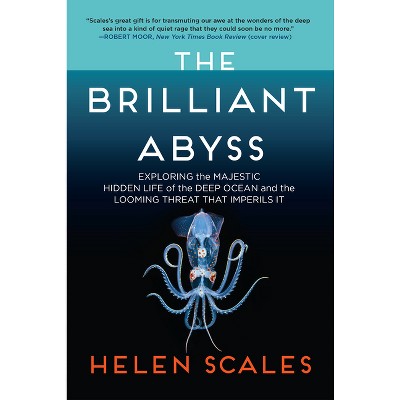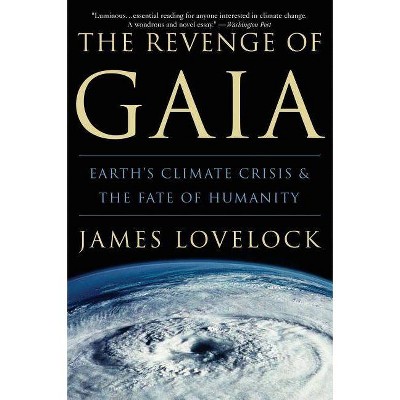Sponsored

The Primacy of Doubt - by Tim Palmer (Hardcover)
Out of Stock
Sponsored
About this item
Highlights
- "Quite possibly the best popular science book I've ever read" (Popular Science) shows how the tools that enabled us to overcome the uncertainty of the weather will enable us to find new answers to modern science's most pressing questions Why does your weather app say "There's a 10% chance of rain" instead of "It will be sunny tomorrow"?
- About the Author: Tim Palmer, FRS, CBE is a Royal Society Research Professor in the department of physics at the University of Oxford.
- 320 Pages
- Science, Earth Sciences
Description
About the Book
"On October 16, 1987 meteorologists predicted a nice, breezy day in the south of England. Instead, the countryside was battered by the worst storm to hit the country in over 300 years. Twenty-two people were killed and damages totaled more than 3.3 million dollars. In the aftermath, scientists asked themselves: why was the forecast wrong? What could have been done to predict this? Meteorologist Tim Palmer discovered the answer: it comes down to embracing chaos. In The Primacy of Doubt, Palmer tells the story of how scientists learned to accurately predict the weather, and how we can use those insights to predict everything else, from the workings of the brain and how it creates consciousness to how quantum mechanics enables everything we see to emerge from just four basic particles. The key is embracing uncertainty. In the case of the Great Storm of 1987, Palmer found, forecasters were too obsessed with finding an on-off switch in their models: either it would be stormy or it wouldn't. Palmer led the charge to inject probabilistic forecasting into weather models, a massive breakthrough that has revolutionized our ability not only to know whether to bring an umbrella, but to prevent life-threatening catastrophes. But weather isn't the only thing that we use deterministic models to predict. Our understanding of quantum physics, climate change, and the economy could all be revolutionized by acknowledging uncertainty, Palmer argues, and those revolutions are long overdue. A fascinating firsthand account of the science of uncertainty, The Primacy of Doubt is for anyone seeking to better understand not just what scientists do and don't understand about the universe. The Primacy of Doubt proves one thing for certain: the key to knowing is to admit when you don't know"--Book Synopsis
"Quite possibly the best popular science book I've ever read" (Popular Science) shows how the tools that enabled us to overcome the uncertainty of the weather will enable us to find new answers to modern science's most pressing questions
Why does your weather app say "There's a 10% chance of rain" instead of "It will be sunny tomorrow"? In large part this is due to the insight of Tim Palmer, who made uncertainty essential to the study of weather and climate. Now he wants to apply it to how we study everything else.
In The Primacy of Doubt, Palmer argues that embracing the mathematics of uncertainty is vital to understanding ourselves and the universe around us. Whether we want to predict climate change or market crashes, understand how the brain is able to outpace supercomputers, or find a theory that links quantum and cosmological physics, Palmer shows how his vision of mathematical uncertainty provides new insights into some of the deepest problems in science. The result is a revolution--one that shows that power begins by embracing what we don't know.
Review Quotes
"This is quite possibly the best popular science book I've ever read (and I've read many hundreds)"--Brian Clegg, Popular Science
"The Primacy of Doubt is an important book by one of the pioneers of dynamical weather prediction, indispensable for daily life, describing how the approach can be used for prediction in other areas, such as climate, health, economy, and conflict."--Suki Manabe, winner of the 2021 Nobel Prize in Physics
"In a whirlwind of a book that's partly scientific autobiography and partly the manifesto of a visionary, Tim Palmer masterfully weaves together climate change and quantum mechanics into one coherent whole. Using uncertainty as a unifying principle, Palmer puts forward new perspectives on old problems. A revolutionary thinker way ahead of his time."
--Sabine Hossenfelder, author of Existential Physics and Lost in Math
"Tim Palmer's book The Primacy of Doubt provides a remarkably broad-ranging account of uncertainty in physics, in all its various aspects. I strongly recommend this highly thought-provoking book."--Roger Penrose, winner of the 2020 Nobel Prize in Physics
"Tim Palmer is a scientific polymath. It's hard to think of anyone else who could have written so authoritatively-- and so accessibly--on themes extending from quantum gravity to climate modelling. This fascinating and important book offers some profoundly original speculations on conceptual linkages across different sciences."
--Lord Martin Rees, Astronomer Royal of the United Kingdom
About the Author
Tim Palmer, FRS, CBE is a Royal Society Research Professor in the department of physics at the University of Oxford. He pioneered the development of operational ensemble weather and climate forecasting, and in 2007, he was formally recognized as having contributed to the Intergovernmental Panel on Climate Change's Nobel Peace Prize. Palmer is a Commander of the British Empire, a fellow of the Royal Society and the National Academy of Sciences, and a recipient of the Institute of Physics' Dirac Gold Medal. He lives near Oxford, UK.Shipping details
Return details
Trending Non-Fiction

















